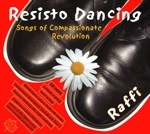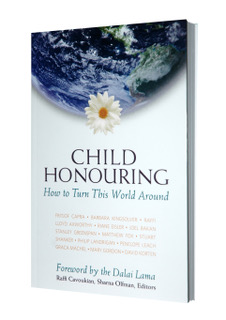|
Child HonouringChild Honouring is a philosophy developed by Raffi — a vision, an organizing principle, and a way of life that puts children at the centre of our deliberations and decisions for today and the future. Raffi calls it the children-first way of sustainability.
Child Honouring is a children-first approach to healing communities and restoring ecosystems. It views how we regard and treat our young as the key to building a humane and sustainable world. It is a novel idea — organizing society around the needs of its youngest members. Its spirit is invitational — a call to imagine and create a diversity of child-friendly cultures. A child-honouring society would show love for its children, and therefore for all of us, in every facet of its design and organization. 
In the 1990s, Canadian children's singer, Raffi, had an epiphany (or rather, a slow dawning) that helped him realize that putting children at the centre of our discussions, planning and decision-making at all levels (from personal/family to business/government to national/international) could be transformative and revolutionary. According to the Raffi Foundation for Child Honouring, this integrated philosophy for healthy child development, sustainable communities, and a child-friendly world starts with three givens:
A Child Honouring CovenantThe essence of the vision of child honouring is expressed in A Covenant for Honouring Children, written by Raffi and inspired, supported and signed onto by dignitaries of all faiths and creeds around the world, such as Jane Goodall, the Dalai Lama, Nelson Mandela, Riane Eisler, Matthew Fox, Fritjof Capra, David Korten and Barbara Kingsolver. Here are the nine guiding principles that, taken together, "offer a holistic way of restoring natural and human communities, thus brightening the outlook for the world we share."
You can read the full Covenant for Honouring Children and download it here (scroll down). A Compassionate RevolutionWhen asked why he has shifted his focus from music and entertainment for children to working with adults, Raffi responded:
And when asked why he is promoting a "compassionate revolution" (a term he coined) to spread the concept of child honouring, Raffi explained:

—Peter M. Senge United Nations Convention on the Rights of the ChildMany people don't realize that the UN Convention on the Rights of the Child is a legally binding international instrument developed in 1989 to recognize that children have human rights, too. The Convention spells out the basic human rights that children everywhere have:
The four core principles of the Convention are:
The Convention spells out the rights that are inherent to the human dignity and harmonious development of every child. It also protects children's rights by setting standards in:
Article 24 relates specifically to the connection between children and sustainability and environmental issues. It states:
N.B. Only two countries in the world have not ratified the Convention on the Rights of the Child. Kindly contact GreenHeart Education if you hear that Somalia or the United States of America has finally ratified it. Can you picture it? A world that puts the welfare and well-being of all children at the heart of all decisions and actions? Can you picture your school adopting a child-honouring mission statement It's certainly one way of honouring the sustainable development principle of intergenerational equity ... and the indigenous concept of the Seven Generations.
Read Raffi's essay The Right to a Future on his
|

